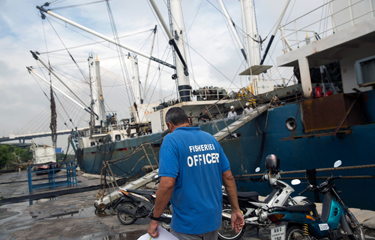Pew calls for RFMOs to take leadership role on IUU fight

A report released 5 June by The Pew Charitable Trusts – along with its E.U. Coalition partners Oceana, WWF, The Nature Conservancy, and the Environmental Justice Foundation – outlines the minimum transparency and anti-IUU fishing measures considered to be vital for the regional fisheries management organizations (RFMOs), who manage fish stocks in more than 90 percent of the world’s oceans.
The report, “Achieving Transparency and Combating IUU Fishing in RFMOs,” makes recommendations for identification, tracking, and traceability along the entire value chain from the point of harvest, through landing, transportation, and trade of fish products.
Transparency, accountability and an effective deterrent monitoring and sanctioning system are promoted as the most effective tools to stop vessels and nationals engaged in IUU fishing. It is estimated that up to one in five wild-caught fish is taken illegally, feeding into a global business worth billions of dollars each year, and representing at least 15 percent of the world fish catch.
“With the environmental and economic viability of global fisheries in crisis, illegal, unreported and unregulated (IUU) fishing remains one of the biggest threats to the sustainable management of marine resources,” Peter Horn, Pew’s project director for international fisheries, told SeafoodSource. “Our report highlights how regional fisheries management organisations can more effectively manage their waters and thereby protect our ocean and the livelihoods that depend on it. These organizations are critical to the governance and health of the ocean, but their members often fail to adopt or implement management measures that are needed to conserve its resources. As the world’s largest seafood trader, the European Union can help to change this. By working with others, we can lead the charge for sustainable fish stocks and safeguards against illegal fishing practices."
The E.U. accounts for around 5 percent of the global catch, ranking fourth after China, Indonesia and India. E.U. fishing activity outside E.U. waters or areas beyond national jurisdiction are mostly in RFMO areas, and make up 18 percent of the E.U.’s 839,000 metric ton catch, and 19 percent of the total value, at EUR 1.4 billion (USD 1.58 billion).
The report acknowledges that the E.U. has shown leadership in improving international ocean governance, increasing transparency and countering IUU fishing. This is demonstrated by the commitment made by the E.U., along with other RFMO members, to deliver on the United Nations Sustainable Development Goal (SDG) agenda, particularly Goal 14 – Conserve and sustainably use the oceans, seas and marine resources for sustainable development. Target 14.4 seeks to “effectively regulate harvesting, and end overfishing, illegal, unreported and unregulated (IUU) fishing and destructive fishing practices.”
According to Environmental Justice Foundation Deputy Director Max Schmid, the E.U.’s positive influence is needed to help RFMOs eradicate IUU fishing through effectively implemented and enforced measures.
“A key aspect of this will be promoting transparency in fisheries, which can be achieved using simple, low-cost measures that are within reach of all regions,” he said.
Considerable progress has already been made, but much remains to be done to achieve full commitment and compliance from RFMO members, and ensure the long-term sustainability of shared fisheries resources. There is, for example, an urgent need to close all loopholes currently open to IUU fishing operators and to strengthen IUU vessel lists.
The report identifies the tools available to improve traceability and transparency, including catch documentation schemes, and recommends that 100 percent of transhipped catches are monitored and reported, or that a complete ban should be considered.
Tools to reinforce anti-IUU fishing measures include the implementation of Port State Measures Agreement that close ports to IUU caught products, reinforcing flag-state control over vessels, and strengthening information exchange on fishing vessel activities.
“If people steal fish stocks and no one checks what is happening, there is an immediate impact on the fish stocks themselves, but it also makes it difficult to undertake a proper scientific assessment to ascertain what the maximum sustainable yield should be, and this in turn leads to a circle of unknown damage,” Horn said.
Horn said the work being undertaken by Pew was guided by a mission of implementing change from the current status quo.
“IUU fishing is symptomatic of a weak governance structure, where people are looking to exploit things that are not covered, and it has a disproportionate effect on people with low incomes, especially in coastal communities where it affects the local fishing industries and food security,” Horn said. “Helping to put this right is at the core our new international fisheries strategy, which has been operational since 1 April this year, and has brought together all the projects we are working on in this field. For example, we are looking at how RFMOs should function, set their harvest strategies, and go about their compliance, and at the same time, looking at how we can monitor control better, and overlook the fishing industry and find the people who can help that happen.”
Photo courtesy of The Pew Charitable Trusts






Share